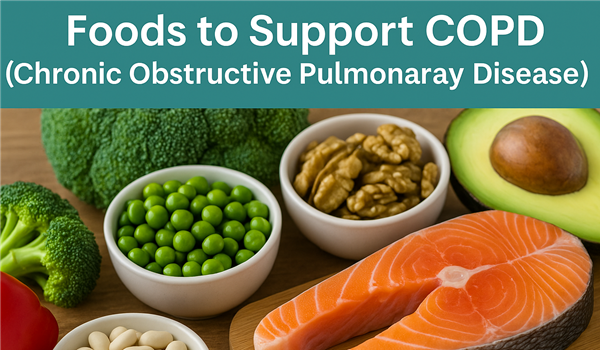COPD diet lung nutrition support

Patient Information Leaflet: Foods to Support COPD (Chronic Obstructive Pulmonary Disease)
Kensington Medical Centre – Belfast
⸻
What Is COPD?
Chronic Obstructive Pulmonary Disease (COPD) includes lung conditions like chronic bronchitis and emphysema. These make breathing difficult over time. Eating well can help you manage symptoms, maintain strength, and improve energy levels.
⸻
Why Diet Matters in COPD
The right foods can help by:
• Supporting your immune system
• Reducing inflammation in the lungs
• Maintaining a healthy weight
• Giving you energy to breathe and stay active
⸻
Key Nutrients for Lung Health
1. Protein – Keeps your muscles strong, including those used for breathing
2. Healthy Fats – Provide long-lasting energy
3. Complex Carbohydrates – Offer steady energy
4. Vitamins and Antioxidants – Protect lung tissues and support the immune system
5. Fluids – Help thin mucus, making it easier to clear your lungs
⸻
Foods That Help Manage COPD
Protein-Rich Foods:
• Eggs, lean meats, fish, chicken
• Dairy products like yoghurt and cheese
• Beans, lentils, tofu, and nuts
Healthy Fats:
• Olive oil, avocados
• Nuts and seeds
• Oily fish (like salmon, sardines, mackerel)
Complex Carbohydrates:
• Wholegrain bread, brown rice, oats
• Vegetables and legumes
• Sweet potatoes and pulses
Antioxidant-Rich Fruits and Vegetables:
• Tomatoes, peppers, carrots, spinach
• Berries, oranges, apples, broccoli
• Aim for at least 5 portions daily
Hydration:
• Water, herbal teas, low-sugar drinks
• Aim for 6 glasses of fluid a day unless advised otherwise by your doctor
⸻
Foods to Limit
• Processed and fried foods – often high in salt, sugar, and unhealthy fats
• High-salt foods – can cause water retention and make breathing harder
• Sugary snacks and drinks – offer little nutrition and may lead to weight gain
• Gas-producing foods (e.g., fizzy drinks, beans, cabbage) – may cause bloating, which can make breathing uncomfortable
• Alcohol – may interfere with medications or cause dehydration
⸻
Helpful Tips
• Eat small, frequent meals to avoid feeling too full
• Try soft or easy-to-chew foods if breathing is hard during meals
• Sit upright while eating to help breathing
• Take your time when eating
• If you are underweight, your doctor may recommend high-calorie snacks or supplements
• If you are overweight, losing some weight can make breathing easier
⸻
When to See a Doctor
Talk to your GP if you:
• Are losing weight without trying
• Feel too tired or breathless to eat
• Have trouble chewing or swallowing
• Want to know if nutritional supplements are right for you
• Have worsening COPD symptoms
Your GP or respiratory nurse can guide you and may refer you to a dietitian for personalised support.
⸻
For more information, visit www.nhs.uk/conditions/chronic-obstructive-pulmonary-disease-copd
This leaflet is for general information only. Please speak to your healthcare provider for advice specific to you.
Medical Disclaimer
The dietary advice and information provided in this leaflet are for general guidance and educational purposes only. They are not intended to replace personalised advice, diagnosis, or treatment from a qualified healthcare professional.
If you have a medical condition, are taking medication, are pregnant or breastfeeding, or have specific dietary needs or food allergies, you should consult your GP, dietitian, or another healthcare provider before making significant changes to your diet.
Following general dietary recommendations without proper medical supervision may not be suitable for everyone and could result in unintended health effects. Always seek individualised medical advice for your personal health circumstances.
Page created: 01 June 2025